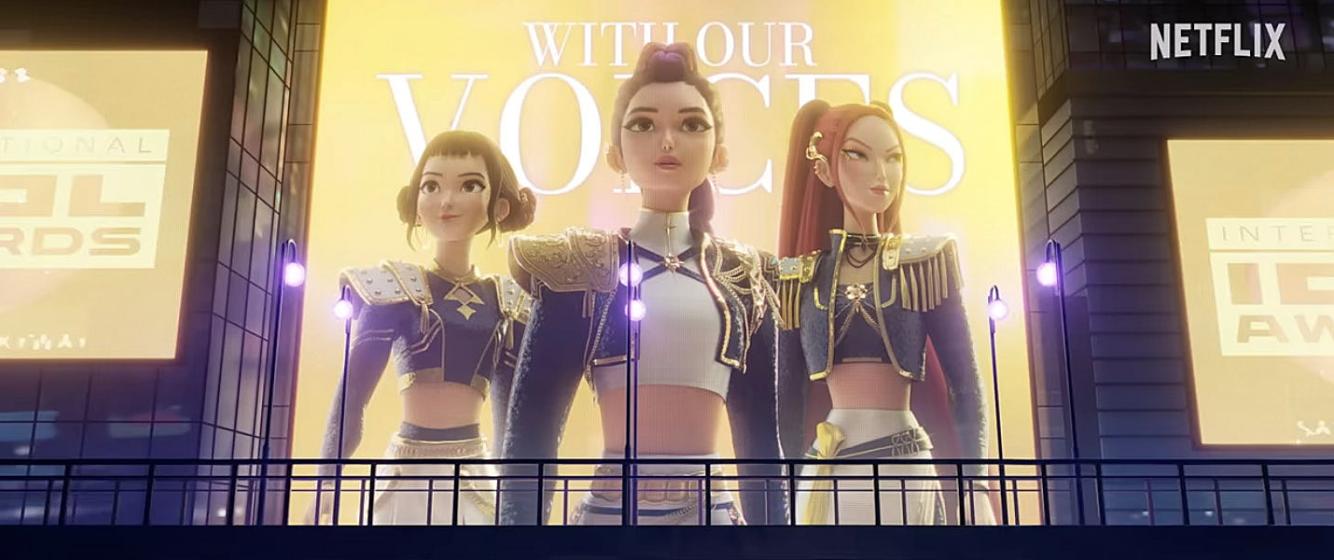
Kpop Demon Hunters and the Transnational Sound of Diaspora
K-pop idols who secretly fight demons. That's the unusual premise of K-pop Demon Hunters (2025), Netflix's all-time most-watched movie. When my students wouldn't stop talking about it in class, I had to see what the fuss was about. They told me it's about identity, and about K-pop idols and teens reclaiming their authentic voices. But this film goes beyond mere teen identity, as it also shines as a transnational story of the Korean and Asian American diaspora, told through voices that have lived between two worlds.
Its anthem "Golden" (2025), written by Korean American songwriter EJAE (Kim Eun-jae) and American composer Mark Sonnenblick, topped charts in twenty countries with its lyrics of feeling invisible or lost, hiding parts of themselves and trying to live up to expectations, and ultimately embracing one's identity. These are lyrics that many teenagers, facing insecurities, can relate to.
But I think much of the talk about the movie misses another key point. Consider some of the lyrics to its hit song Golden (2025):
I lived two lives, tried to play both sides
But I couldn't find my own place
Or the refrain:
Oh, I'm done hidin', now I'm shinin' like I'm born to be
Oh, our time, no fears, no lies
That's who we're born to be
Listen carefully, realize Korean Americans cowrote and sang this song, and you realize that while this song speaks to teenagers universally, this movie also speaks specifically to the Korean American and Asian American experiences.
A Transnational Film for a Transnational Genre
What kind of movie is this? The title itself offers a clue: K-pop Demon Hunters, not Korean Demon Hunters. This title represents the transnational nature of K-pop and hallyu (Korean Wave) itself, a cultural form that has always crossed borders and languages.
The film is set in Korea and references Korean mythology, but reveals transnational clues everywhere. The trio HUNTR/X resembles S.E.S, one of the first transnational K-pop girl groups. S.E.S. had members from Korea, Guam, and Japan. Within the film, the characters show this same mix: Mira is from Korea, Zoey is from the United States, and Rumi has an "unknown" origin but a Japanese or Persian name (and the name of the director’s daughter).
K-pop has long celebrated such hybridity. Groups like TWICE, LE SSERAFIM, and ILLIT include members from Japan, the U.S., and beyond. HUNTR/X fits right into this transnational mix.
Also, this film is no more a Korean movie than Mulan is Chinese or Frozen is Norwegian. Produced by Sony Entertainment (based in the U.S.) and directed by Korean Canadian Maggie Kang and Idaho-born Chris Appelhans, the film is a transnational production. Its fictional idol group HUNTR/X is voiced by Korean American, Korean Canadian, and Korean performers. This combination reflects how diasporic talent and Hollywood production now shape the global image of K-pop. What does this film say about K-pop's global identity, and what does it mean for all of us who grew up between cultures?
Korean American Voices, Transpacific Sound
Audrey Nuna, the singing voice of Mira, became emotional on The Tonight Show, recalling how she'd hide her kimbap lunch as one of the few Korean American kids in her school, eating "one piece at a time, close" to avoid standing out among her non-Korean classmates. Her shame at eating kimbap was something that Koreans may not understand, but many Korean American youth, eager to fit in with non-Korean peers, can relate to. Seen in this light, Golden's lyrics of "I'm done hidin'" take on a different meaning.
This film proudly celebrates Korean culture, reflecting the rediscovered pride of many Korean Americans. Over 1.8 million Korean Americans make up about 0.6% of the US population. 57% are immigrants, which means they were born in Korea and moved to the United States. This shows how many Korean Americans have connections to both nations and understand both cultures.
The cast reflects this duality: speaking voices include Arden Cho (Texas-born to Korean parents), May Hong (Korea to U.S. at age 6), and Ji-young Yoo (Colorado-born). Singing voices EJAE, Audrey Nuna, and Rei Ami are all Korean Americans who grew up between worlds. Romantic male lead Jinu is voiced by Ahn Hyo-seop (raised in Korea) and sung by Andrew Choi (raised in the U.S).
The actors in K-pop Demon Hunters bring their personal experiences of living between two worlds to their performances, embodying the very hybridity K-pop celebrates.
Korean culture plays a key part in the film. EJAE explained that including Korean lyrics in an English-language production was essential to honoring K-pop's roots.
...[I]t was important to showcase Korean culture. Both the director and the studio insisted on including Korean lyrics. Since most people know the chorus, it was crucial to have Korean in that part. I felt proud. At the US sing-along screenings, it was wonderful to hear everyone singing 'A bond that can never be broken~' in Korean.
The film makes more joyful cultural references. The characters eat ramyun (Korean instant noodles), and viewers encounter Korean legends like jeoseung saja (grim reaper) and the hojakdo (tiger and magpie) traditional paintings. There are probably more hangul (Korean alphabet) signs in this movie than in a typical K-pop video, which tends to use more English signs.
This transnational production celebrates Korean heritage, something members of the Korean diaspora proudly contributed to. And it tells them to be true to themselves as people who formerly “lived two lives”.
The imagery shows the meaning of living this double identity as seen in Korean American Zoey’s life: living in the Korean world and the American world, and trying to figure out how to combine them and be true to both of them.
An Asian American Watching HUNTR/X Arrive on the Global Stage
As I watched the singing voices for HUNTR/X perform on The Tonight Show Starring Jimmy Fallon on October 7, 2025, I felt a lump in my throat. Younger people might not understand what that moment meant. For decades, Asian Americans (Americans of Asian descent) were either invisible or reduced to stereotypes such as the punchline, the sidekick, the kung fu master - all roles that reinforced the idea that Asians didn’t belong in mainstream American culture. But in this show, three Asian American singers performed on national television without being exoticized. The fact that they were labeled not only as Asian but simply as artists, told me we had finally arrived. And I thank K-pop for that.
This is a movie that the Korean and Korean diaspora community can be justifiably proud of. And I'm not Korean American, but as a member of Asian America, I can relate to this film. Korean Americans are part of the larger Asian American population (7% of the U.S.) , alongside larger Chinese, Indian, Filipino, and Vietnamese American (and many more) communities.
The emotional weight behind K-pop Demon Hunters connects deeply with Asian Americans who have lived between cultures: too Asian for America, too American for Asia. I could feel the lyrics "tried to play both sides, but I couldn't find my own place". I also heard this so much from other Asian Americans who grew up in the continental U.S., as this feeling of not belonging is common.
Diaspora, Invisibility, and the Search for Belonging
One key theme of the movie is Rumi trying to understand her heritage. She tries to hide an important part of herself from her friends and fans. This story of hiding who you really are speaks to many Asian Americans, who know what it means to not fit in. Though we make up around seven percent of the U.S. population, we've often been invisible in American media. Until recently, Asian men were almost entirely erased from romantic storylines. Asian women were typecast into narrow roles, meaning they could only play certain limited types of characters, usually stereotypes. The brilliant early twentieth century Chinese American actress Anna May Wong, for example, although opening doors for others to follow, was limited to playing the “Dragon Lady” (cunning, dangerous woman) or the “Lotus Blossom” (submissive, tragic woman) and never the main actress of her own story.
Diaspora Asians often don't fit into Asia either. Take Rosé from BLACKPINK, a Korean New Zealander raised in Australia. She has spoken about never feeling fully at home - too Korean for Australia, too Australian for Korea. The aforementioned Anna May Wong was also heavily criticized during her tour of China for spreading demeaning images of Chinese women. The result is constant negotiation of identity, always adjusting who you show yourself to be depending on where you are, always having to hide one side.
K-pop becomes a rare space where having two identities is celebrated rather than hidden or pushed down. For many young fans, K-pop offers what Hollywood rarely has: a mirror where Asian faces are desirable, complex, and cool.
This sense of in-betweenness makes K-pop Demon Hunters resonate across Asian American communities, not just Korean Americans. Eleven-year-old Filipina American Ella Pereyra, who modeled Spirit Halloween's Rumi costume, captures this: "I feel very grateful that they made a movie about people that looked like me." Whether Korean, Filipino, Chinese, Indian, Vietnamese, or Japanese American, we recognize ourselves in Rumi's journey of hiding and eventually embracing who she is.
K-pop and the Pop Pacific
This transnational dialogue is part of what I call the Pop Pacific, a cultural sphere connecting the U.S., Japan, and Korea. K-pop emerged from this world, shaped by American R&B and hip-hop, Japanese idol culture, and diasporic creativity. The result is a sound that belongs to no single nation, but to a shared transpacific imagination.
K-pop Demon Hunters makes this hybridity visible. The film may have been made in the U.S., but its rhythms, languages, and aesthetics belong to the Pop Pacific. It shows how K-pop's appeal lies in its mixture and blending of different cultures and influences.
EJAE, the singing voice of Rumi, has spoken about wanting to be a role model for Korean Americans and the wider community of Asian American youth. In an interview with the Korea Herald, she noted that winning a Grammy "wouldn't just be a personal milestone. It would be a message to every Asian American girl who's ever felt impostor syndrome in this industry." She added: "As an Asian American, specifically a Korean American woman, I don't really see enough people who look like me in the pop and K-pop industry. That's why winning an award for a song about hope and chasing your dreams would be incredibly serendipitous."
When I saw the voice actresses for HUNTR/X perform on The Tonight Show Starring Jimmy Fallon, I realized I was witnessing a quiet revolution. Three Asian American women were singing a pop anthem that millions already knew by heart. No explanations, no apologies, no subtitles. Just music. And that simplicity says everything. Somewhere, a young Asian American kid is watching and finally seeing themselves as the hero. They're done hiding.
_____________________________
Jayson Makoto Chun is a professor at the University of Hawai‘i – West O‘ahu specializing in Asian popular media culture. He has written “A Nation of a Hundred Million Idiots”?: A Social History of Japanese Television, 1953–1973(2006). Email: jmchun@hawaii.edu
Discussion Questions
- In the film K-pop Demon Hunters, why is the song “Golden” important for the story of identity?
- Have you ever felt “in between” two cultures, languages, or groups? How does that feeling connect to Rumi’s story of hiding her true self?
- Do you think K-pop Demon Hunters is more of a “Korean film” or a “global film”? Why?
- Audrey Nuna said she used to hide her Korean food at school. What do you think her story tells us about the challenges of being a minority in another country?
- Imagine you are making a film about your own culture for a world audience. What parts of your culture would you include, and why?
- Write a new lyric (one or two lines) that could fit into the song “Golden,” showing the idea of living between two worlds.
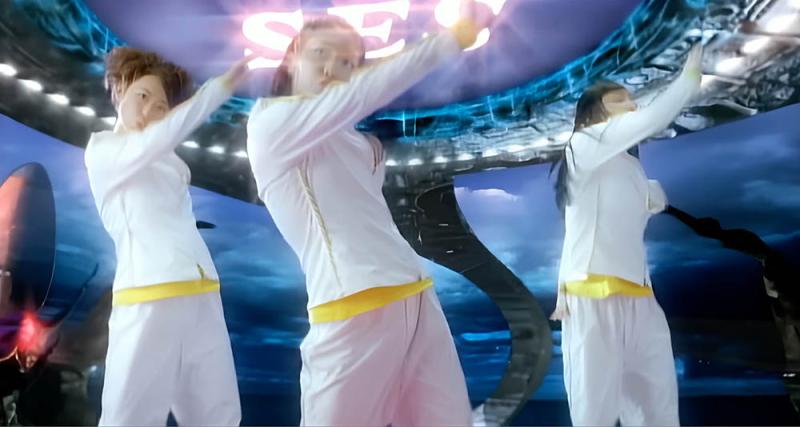
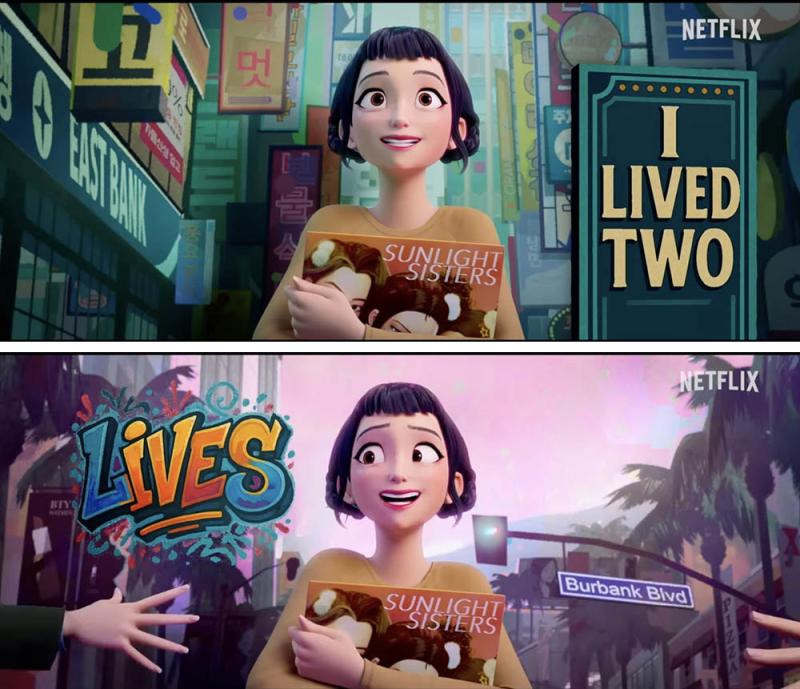
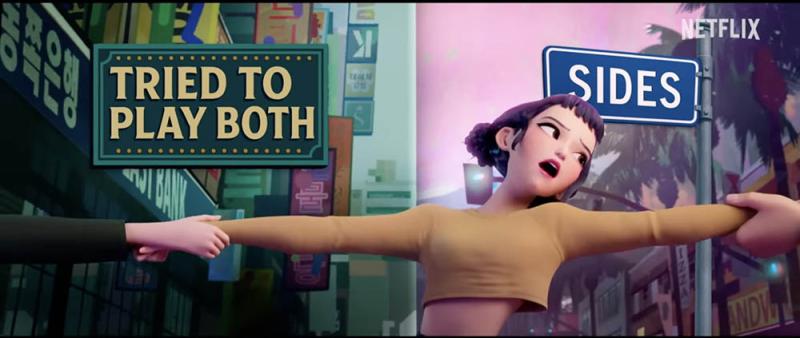
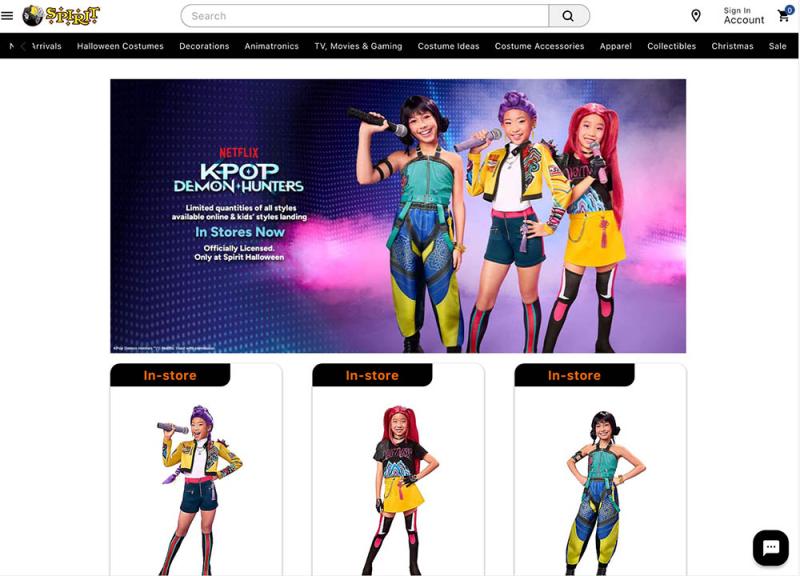

Comments
Discussion Questions
Add new comment